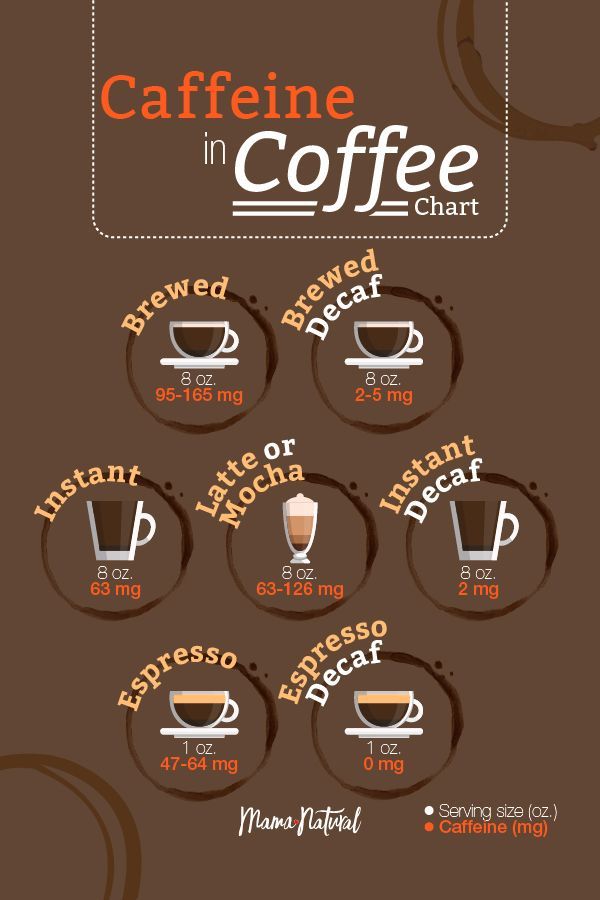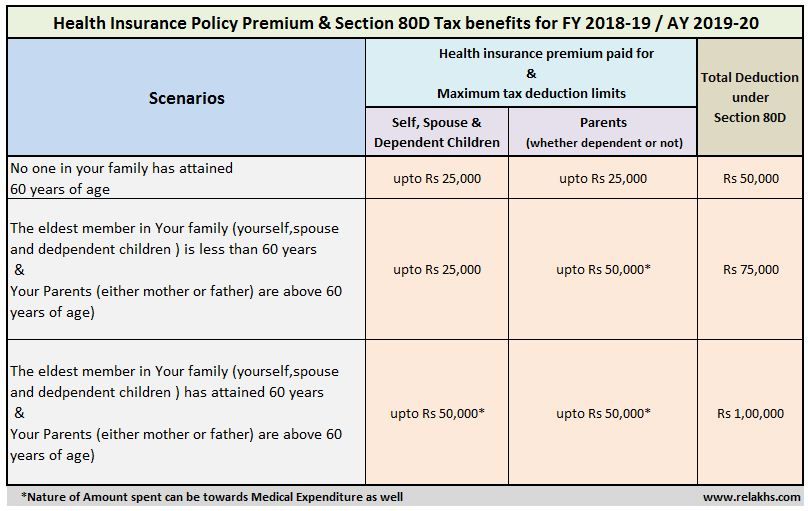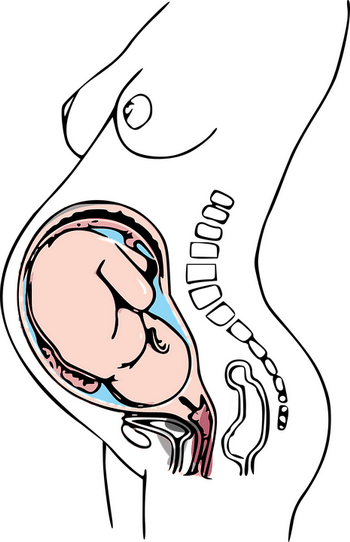Should i drink coffee while pregnant
Is Any Amount of Coffee Safe for Baby During Pregnancy?
By Denise MannHealthDay Reporter
FRIDAY, Feb. 12, 2021 (HealthDay News) -- Too much coffee during pregnancy could lead to kids with behavior problems later on.
That's the key takeaway from new research that examined 9,000 brain scans from 9- and 10-year-olds as part of the largest long-term study of brain development and child health.
"The goalposts are moved by caffeine, and there are subtle, but real changes in behavioral outcomes in most kids who were exposed to caffeine in utero," said study author John Foxe. He is director of the Del Monte Institute for Neuroscience at the University of Rochester in Rochester, N.Y.
"This may not make a meaningful difference in the behaviors of some kids, but for those who are vulnerable in other ways, it may flip them over the threshold," Foxe added.
For years, pregnant women have been told to limit their caffeine intake to lower their risk for miscarriage or preterm birth, but this new study suggests that pregnant women who consume any coffee may be more likely to have kids with behavioral issues later in life.
Brain scans of kids whose mothers consumed caffeine during pregnancy showed changes in pathways that could lead to behavioral problems later on, including attention difficulties and hyperactivity. The changes tracked with higher scores on checklists for problem behaviors seen among kids whose moms reported drinking coffee while pregnant.
Most of the behavioral issues seen in the kids were minor, but noticeable, Foxe said. Other risks for developing behavioral issues include family history and some social and economic factors, he added.
While it's known the fetus can't break down caffeine when it crosses the placenta, Foxe said exactly how or at what point in pregnancy caffeine leads to these changes is not fully understood.
The study did not find any changes in the children's intelligence or thinking ability.
The American College of Obstetricians and Gynecologists suggests pregnant women limit their caffeine intake to 200 milligrams per day. That's about two 6-ounce cups, but even that may be too much, the study suggested.
"I would advise pregnant women to take in as little caffeine as possible and switch to decaf altogether if they can," Foxe said.
But he urged women not to go cold turkey if they can help it, because caffeine withdrawal can cause a host of symptoms, including headaches, irritability, nausea and difficulty concentrating.
"We don't know what withdrawal, irritability, stress and anxiety will do to a pregnancy," Foxe said. "Try to whittle away at your caffeine consumption before you get pregnant."
The study does have some limitations. Women were asked to recall how much caffeine they consumed while pregnant, and memory isn't always 100% accurate.
The findings were recently published online in the journal Neuropharmacology.
Dr. Mark Klebanoff, principal investigator at the Center for Perinatal Research in Columbus, Ohio, said many studies have looked at the effects of caffeine on pregnancy outcomes, such as risk of miscarriage. But less is known about how caffeine affects kids as they age.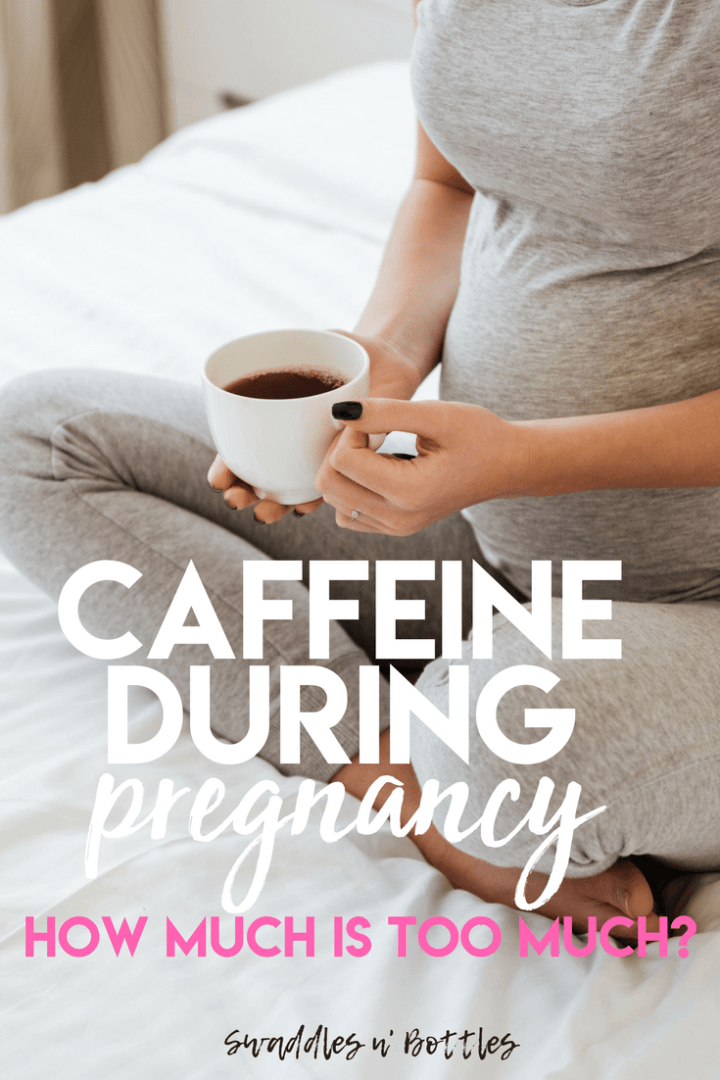
"The new study adds to the literature, but it's not enough to really implicate caffeine in any strong way," said Klebanoff, who was not involved with the study but reviewed the findings.
"Pregnant women can be reasonably reassured that consuming less than 200 milligrams per day of caffeine will not cause miscarriage or preterm birth," he said. But more study is needed on how it affects child development, Klebanoff added.
"A typical cup at home has about 100 mg of caffeine, so women can limit themselves to two cups a day when pregnant," he said.
But they should keep in mind that other sources of caffeine (such as energy drinks, power bars and chocolate) should be considered as part of the total, Klebanoff said.
More information
The American College of Obstetricians and Gynecologists offers advice on coffee and caffeine during pregnancy.
SOURCES: John Foxe, PhD, director, Del Monte Institute for Neuroscience, University of Rochester, Rochester, N. Y.; Mark Klebanoff, MD, principal investigator, Center for Perinatal Research, Abigail Wexner Research Institute, Nationwide Children's Hospital, Columbus, Ohio; Neuropharmacology, Jan. 30, 2021, online
Y.; Mark Klebanoff, MD, principal investigator, Center for Perinatal Research, Abigail Wexner Research Institute, Nationwide Children's Hospital, Columbus, Ohio; Neuropharmacology, Jan. 30, 2021, online
Caffeine Intake During Pregnancy | American Pregnancy Association
Caffeine is one of the most loved stimulants in America. But Because caffeine can raise blood pressure, pregnant women should limit caffeine during pregnancy.
Facts About Caffeine
Caffeine is a stimulant and a diuretic. Because caffeine is a stimulant, it increases your blood pressure and heart rate, both of which are not recommended during pregnancy.
Caffeine also increases the frequency of urination. This causes a reduction in your body fluid levels and can lead to dehydration.
Caffeine crosses the placenta to your baby. Although you may be able to handle the amounts of caffeine you feed your body, your baby doesn’t have the enzymes needed to metabolize caffeine.
Any amount of caffeine can also cause changes in your baby’s sleep pattern or normal movement pattern in the later stages of pregnancy. Remember, caffeine is a stimulant and can keep both you and your baby awake.
Caffeine is found in more than just coffee. Caffeine is not only found in coffee but also in tea, soda, chocolate, and even some over-the-counter medications that relieve headaches. Be aware of what you consume.
Caffeine Facts or Myths?
Statement: Caffeine causes birth defects in humans
Facts: Numerous studies on animals have shown that caffeine can cause birth defects, premature labor, preterm delivery, reduced fertility, and increase the risk of low-birth-weight offspring and other reproductive problems.
There have not been any conclusive studies done on humans; however, it is still better to play it safe when it comes to inconclusive studies.
Statement: Caffeine causes infertility
Facts: Some studies have shown a link between high levels of caffeine consumption and delayed conception.
Statement: Caffeine causes miscarriages
Facts: In 2008, two studies on the effects of caffeine related to miscarriage showed significantly different outcomes. In one study released by the American Journal of Obstetrics and Gynecology, it was found that women who consume 200mg or more of caffeine daily are twice as likely to have a miscarriage as those who do not consume any caffeine.
According to a 2015 meta-analysis, the risk of miscarriage rose by 19% for every increase of 150 mg per day of caffeine and by 8% for every increase of two cups of coffee per day.
In another study released by Epidemiology, there was no increased risk in women who drank a minimal amount of coffee daily ( between 200-350mg per day.)
Due to conflicting conclusions from numerous studies, the American College of Obstetricians and Gynecologists and the March of Dimes recommend that until more conclusive studies are done, pregnant women should limit caffeine intake to less than 200 mg per day.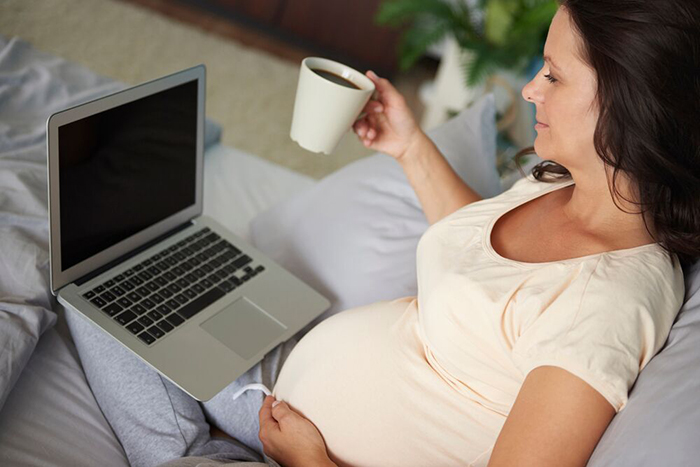 This is equal to about one 12 oz cup of coffee.
This is equal to about one 12 oz cup of coffee.
How much caffeine is in your favorite drinks & snacks?
- Coffee, average (check the specific blend & café that you purchase from for specific levels):
- Brewed, 8 oz. | 95 – 165 mg
- Brewed, decaf, 8 oz. | 2 – 5 mg
- Espresso, 1 oz. | 47 – 64 mg
- Latte, 8 oz. | 63 – 126 mg
- Dr. Pepper (12 oz) 37 mg
- 7 Eleven Big Gulp Diet Coke (32 oz) 124 mg
- 7 Eleven Big Gulp Coca-Cola (32 oz) 92 mg
- Ben & Jerry’s Coffee Buzz Ice Cream (8 oz) 72 mg
- Baker’s chocolate (1 oz) 26 mg
- Green tea (6 oz) 40 mg
- Black tea (6 oz) 45 mg
- Excedrin (per capsule) 65mg
Avoiding caffeine as much as possible is your safest course of action. If you must get your fix, it is best to discuss this with your healthcare provider to make the healthiest choice for you and your baby.
Want to Know More?
- Herbal Tea and Pregnancy
Compiled using information from the following sources:
1.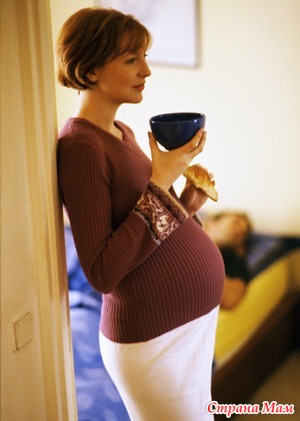 Organization of Teratology Information Services Mother To Baby
Organization of Teratology Information Services Mother To Baby
2. Williams Obstetrics Twenty-Second Ed. Cunningham, F. Gary, et al, Ch. 8.
3. https://www.marchofdimes.com
4. Maternal caffeine consumption during pregnancy and the risk of miscarriage: A prospective cohort study. American Journal of Obstetrics and Gynecology, 198, e1-8.. Weng, X., Odouli, R. & Li, D.K. (2008).
5. Caffeine and miscarriage risk. Epidemiology, 19 (1), 55-62. Savitz, D.A., Chan, R.L., Herring, A.H. & Hartmann, K.E. (2008).
6. The Mayo Clinic: Caffeine content in coffee, tea, soda, and more.
Fullscript: Surprising Effects And Sources of Caffeine: Why it Affects People Differently
Is it possible for pregnant women to have coffee? TEA.RU
Coffee is, without a doubt, one of the most popular beverages that people drink almost all over the world. This is an axiom that does not require proof. For many of us, coffee has long become a tradition, and for some, it is an integral part of our lifestyle. There are people among us who cannot imagine the morning without a cup of strong aromatic drink. If we don’t get the “next dose” of caffeine in the morning, it seems to us that the world around us has lost its colors, the mood is hopelessly spoiled, and in general the day didn’t work out initially.
There are people among us who cannot imagine the morning without a cup of strong aromatic drink. If we don’t get the “next dose” of caffeine in the morning, it seems to us that the world around us has lost its colors, the mood is hopelessly spoiled, and in general the day didn’t work out initially.
According to statistics, women drink coffee more often than the strong half of humanity. And then the day comes when a woman finds out that she is pregnant. For many, the question immediately arises as to whether it is possible to drink coffee during pregnancy, how an invigorating drink can affect the health of the child and mother. Is it possible to drink coffee during pregnancy - this is a rather difficult question that has long been of concern to scientists around the world. Opinions on this matter are very different, many scientists study the use of coffee during pregnancy. Unfortunately, there is still no clear answer to this question. But there are certain studies, the data of which will help to understand this issue.
If we delve deeper into this problem, there are many more questions:
• Is it possible for pregnant women to drink natural coffee or is it better to give preference to an instant drink?
• What kind of coffee can pregnant women drink, and in what cases?
• Should coffee be avoided early in pregnancy or is it necessary later?
• If there is a ban on this drink, why not coffee during pregnancy?
• How much coffee can pregnant women, if the doctor allows?
And these are far from all the questions that a woman asks herself when she finds out about her “interesting position”. After all, many do not want to give up the morning charge of vivacity, but not a single woman would definitely want to harm the unborn baby, which is natural. So, pregnancy and caffeine - let's try to figure it out.
Coffee during pregnancy: yes or no
The question of whether it is possible to drink coffee during pregnancy can only be answered by a doctor who observes her. The fact is that coffee as such has some “contraindications”. Both in early pregnancy and later, and indeed for women, even if they are not in a “special position”, coffee is not useful if:
The fact is that coffee as such has some “contraindications”. Both in early pregnancy and later, and indeed for women, even if they are not in a “special position”, coffee is not useful if:
• history of chronic diseases of the gastrointestinal tract, such as gastritis, hyperacidity, peptic ulcer, and others;
• there is a tendency to high blood pressure, which is already characteristic of pregnant women due to natural physiological reasons;
• Pregnancy occurs during the hot summer months, as drinking caffeinated drinks can lead to dehydration.
• coffee in early pregnancy is contraindicated if a woman has early toxicosis, accompanied by dizziness and nausea;
• a lady "in position" was diagnosed with high cholesterol levels in the blood and in some other conditions.
Thus, drinking or not drinking coffee can be decided only after the pregnant woman is fully examined and registered for pregnancy. Timely early visit to the doctor is the key to the health of both mother and baby.
Examination will allow you to choose the way of life that will be as healthy as possible and contribute to the easy bearing of a child at the very beginning of the journey. The effect of coffee on pregnancy can be different, depending on the general health of the expectant mother and some other factors.
Can I drink instant coffee during pregnancy?
What is instant coffee? Good instant coffee is prepared using sublimation processes and other technologies from natural coffee. The result is a drink rich in micro and macro elements, beneficial nutrients and other compounds. This coffee has all the useful qualities of the original product, polished taste and aroma.
It is worth noting that instant coffee, in comparison with natural coffee, has a lower caffeine content. Accordingly, if there are no contraindications, then instant coffee is possible for pregnant women, but without much fanaticism. If 1 cup a day will not hurt the expectant mother and baby, then 5-6 cups of instant coffee during pregnancy are strongly not recommended by specialists.
Natural coffee during pregnancy
According to research, natural coffee contains 30-40% more caffeine than its soluble counterparts. Because of this, natural coffee has a more pronounced effect on the nervous system of the human body, has a pronounced stimulating effect and can affect the development of the fetus.
Scientists have conducted a number of studies on the long-term effects of coffee on pregnancy. In the course of these studies, it was found that natural coffee during gestation affects the formation of certain brain structures, which can lead to behavioral abnormalities. Such deviations may not appear immediately, not in infancy, but at the age of 9-10 years.
This may be hyperactivity or even aggressive conduct of the child. There is also evidence that in the future a child whose mother abused caffeine-rich drinks during pregnancy is prone to the development of malignant hypertension and various metabolic disorders.
If the pregnancy proceeds without complications, and there are no additional contraindications, then natural coffee in a volume of up to 200 ml is acceptable and does not harm either the mother or the fetus. Can pregnant women drink coffee with milk? Definitely yes! And the more milk you add to your usual drink, the more benefit and less harmful effects on the body of the mother and fetus.
Can I drink decaffeinated coffee during pregnancy?
We have already said that there are cases when coffee during pregnancy is strictly contraindicated. In this case, many coffee drinkers mistakenly assume that decaffeinated coffee can be an alternative. Such a drink is in the assortment of almost every specialized store. Moreover, sellers often recommend such a product to women "in position."
Please note! Doctors do not categorically recommend using decaffeinated coffee, since, among other things, such a product contains substances in large enough quantities that are in no way useful when carrying a fetus:
• essential oils;
• fineness;
• resins;
• cafestol, etc.
These substances are able to very quickly "wash out" calcium from the body of a woman, which is so necessary for the formation of the bones of the fetal skeleton. Thus, decaffeinated coffee during pregnancy is not the best solution and not at all a harmless drink. Its amount should not exceed 1 cup per day if your doctor has allowed you.
When can pregnant women drink coffee?
In some cases, it is worth noting in fairness, pregnant women can drink coffee and a drink can even be useful. These are the cases when:
• the expectant mother has a low level of hemoglobin, which is confirmed by the results of laboratory tests;
• with confirmed iron deficiency anemia;
• with chronic hypotension, that is, if a pregnant woman has low blood pressure;
• there are some deviations in cardiac activity that require correction.
In this case, the ideal option is latte during pregnancy. It is better to cook it like espresso from a coffee machine, to which a large amount of natural milk is added, which replenishes the deficiency of calcium, potassium and other substances useful for the body of the pregnant woman and the fetus.
How coffee affects pregnancy is still being studied by many scientists, and each time more and more contradictory data are found. It follows from this that there is no complete picture of how coffee affects pregnancy in modern medical science. Is coffee allowed during pregnancy is a question that only your doctor can answer, but in this case you yourself must realize and take full responsibility for all possible consequences.
Why take risks if herbal teas, drinks made from natural berries and many other tasty and healthy things can be useful for the health of the unborn baby. A habit is a powerful thing, but it differs in that it can be abandoned at any time if it becomes irrelevant or harmful. And tea ceremonies can be an excellent alternative for you, because it is not only tasty, but also very interesting.
is it still possible or not?
June 16, 2022 12:23 Olga Muraya
There are a number of strict dietary restrictions during pregnancy, but it is not necessary to completely eliminate coffee from your daily diet.
Photo by Anna Civolani/Unsplash.
Researchers confirm that drinking coffee during pregnancy does not pose serious risks to the mother and her unborn child.
An international team of scientists has determined that daily coffee consumption does not increase the risk of preterm birth, miscarriage or stillbirth.
Researchers say that pregnant women can safely drink coffee at least every day without fear of side effects. But it is still necessary to limit its consumption to the recommended rate.
Recall that WHO recommends that pregnant women consume no more than 300 mg of caffeine per day. In the United States and some European countries, the maximum dose of caffeine is even less - 200 mg per day.
In general, these recommendations are equivalent to 1-3 cups of coffee per day, although the amount of caffeine in different coffee drinks can vary greatly.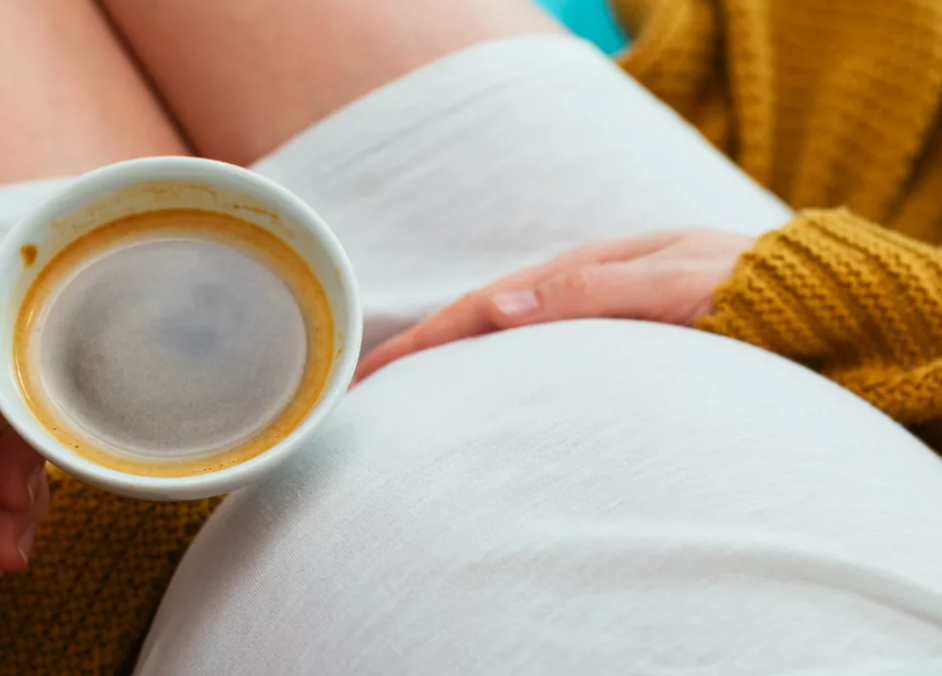
Previous recommendations were based on observational studies. They make it difficult to separate coffee consumption from other risk factors such as smoking, alcohol or poor diet.
The authors of the new study wanted to find out whether coffee itself actually increases the risk of adverse pregnancy outcomes.
They relied on a study that found that a certain set of genetic variants influences how much coffee we drink.
Of course, the researchers couldn't ask women to drink the prescribed amount of coffee during pregnancy to assess health risks. This would be highly unethical.
Instead, they used genetic analysis to mimic a randomized controlled trial. Let us explain that this is the highest quality standard of scientific work in the view of modern scientists.
The researchers used a method called Mendelian randomization. ( It is named after the eminent biologist Gregor Mendel. ) Scientists have studied whether eight genetic variants that predict how much a pregnant woman consumes coffee are also associated with birth outcomes.